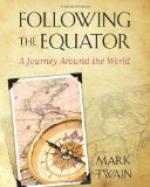alley shaded by evergreen trees cooled by a broad
shallow piece of water running along the middle of
the path to the Taj itself. The Taj is entirely
of marble and gems. The red sandstone of
the other Mohammedan buildings has entirely disappeared,
or rather the red sandstone which used to form the
thickness of the walls, is in the Taj itself overlaid
completely with white marble, and the white marble
is itself inlaid with precious stones arranged
in lovely patterns of flowers. A feeling of
purity impresses itself on the eye and the mind from
the absence of the coarser material which forms
so invariable a material in Agra architecture.
The lower wall and panels are covered with tulips,
oleanders, and fullblown lilies, in flat carving
on the white marble; and although the inlaid
work of flowers done in gems is very brilliant
when looked at closely, there is on the whole but little
color, and the all-prevailing sentiment is one
of whiteness, silence, and calm. The whiteness
is broken only by the fine color of the inlaid
gems, by lines in black marble, and by delicately
written inscriptions, also in black, from the
Koran. Under the dome of the vast mausoleum
a high and beautiful screen of open tracery in white
marble rises around the two tombs, or rather cenotaphs
of the emperor and his princess; and in this
marvel of marble the carving has advanced from
the old geometrical patterns to a trellis-work of
flowers and foliage, handled with great freedom
and spirit. The two cenotaphs in the center
of the exquisite enclosure have no carving except
the plain Kalamdan or oblong pen-box on the tomb of
Emperor Shah Jehan. But both cenotaphs
are inlaid with flowers made of costly gems,
and with the ever graceful oleander scroll.”
Bayard Taylor, after describing the details of the Taj, goes on to say:
“On both sides the palm, the banyan, and the feathery bamboo mingle their foliage; the song of birds meets your ears, and the odor of roses and lemon flowers sweetens the air. Down such a vista and over such a foreground rises the Taj. There is no mystery, no sense of partial failure about the Taj. A thing of perfect beauty and of absolute finish in every detail, it might pass for the work of genii who knew naught of the weaknesses and ills with which mankind are beset.”
All of these details are true. But, taken together, they state a falsehood—to you. You cannot add them up correctly. Those writers know the values of their words and phrases, but to you the words and phrases convey other and uncertain values. To those writers their phrases have values which I think I am now acquainted with; and for the help of the reader I will here repeat certain of those words and phrases, and follow them with numerals which shall represent those values—then we shall see the difference between a writer’s ciphering and a mistaken reader’s—
Precious stones, such as agate, jasper, etc.—5.




